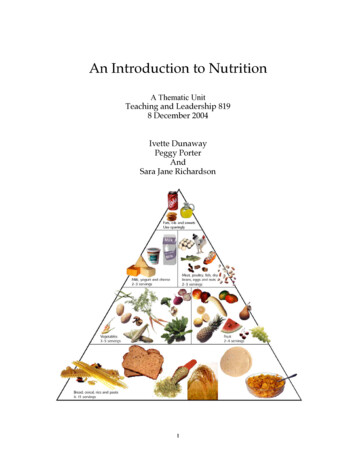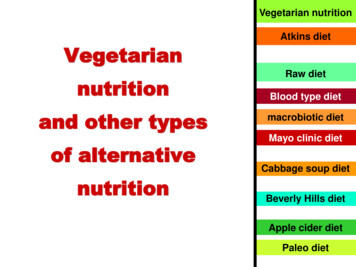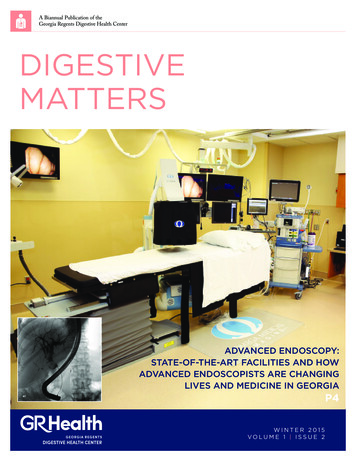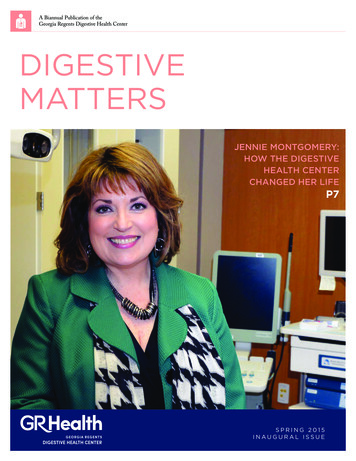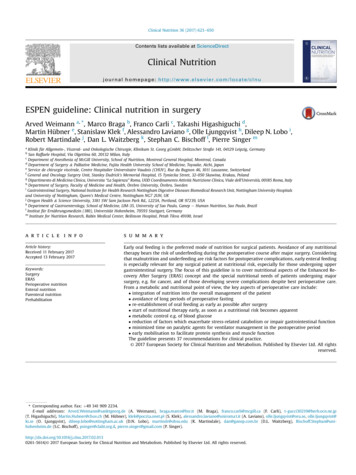
Transcription
Nancy and Bill Norton Patient Education Series October 11, 2020 University of MichiganDiet, Nutrition andDigestive Healthfinding the balance inFood for Life1
AgendaNancy and Bill Norton Patient Education SeriesThe mission and purpose of the creation of the Nancy and Bill Norton Patient Education Series (NES)is to provide useful information about gastrointestinal (GI) disorders to help the many people whosuffer from these conditions. By engaging patients in an educational program, we will promote agreater understanding of the daily experience of their chronic GI illnesses and provide real-worldinsight to better reach their treatment and wellness goals.For individuals suffering with chronic illnesses, including chronic GI conditions, self-managementinterventions play an important role in reducing health care utilization and improving long-termhealth outcomes for patients. These interventions may include patient education, support fordecision-making, self-monitoring of symptoms, adhering to treatment regimens, psychologicaland social support, and maintaining difficult lifestyle changes. The Norton Education Series is aneducational program which includes topics relating to all aspects of GI conditions. This includesinformation from medical professionals as well as topics on the daily experiences and selfmanagement techniques that can be utilized to improve their day-to-day living. The Nancy and BillNorton Patient Education Series will provide patients with an educational program that equips themwith tools and resources to better help them navigate life. With events planned for each year, thisseries is an ongoing program that continues to inform, assist, and support people affected by GIdisorders.For each meeting, IFFGD will work with an IFFGD Advisory Board member at a major medicalcenter to create a program which highlights the strengths of that GI department. The IFFGDAdvisory Board member will serve as the Course Director and will moderate the program. TheCourse Director will provide junior faculty and fellows to serve as presenters in the program. Eachmeeting will be at least a half-day and will include a multitude of activities, such as lectures, Q&Apanels, patient stories, lifestyle presentations, hands on workshops and networking opportunities.IFFGD will live-stream the event for online viewers and record it for placement on a websitespecially designed for the Norton Education Series. The Course Director will work with IFFGD’sEvent Project Manager to create the educational program agenda.Date: October 11, 2020Time: 10:00 AM - 2:00 PM ESTLocation: Streamed live from the Food for Life KitchenGut Matters 101: From top to bottom, Shanti Eswaran, MDAn overview of the parts and functions of the digestive system. Learn about the location and function ofthe esophagus, stomach, small intestine (small bowel), pancreas, liver, gallbladder, colon, and rectum, andthe common disorders associated with each.Gut Matters 102: How the gut works in relation to food, nutrition basics, Amanda Lynett, RDNAn overview of the importance of nutrition to the human body and the impact on gastrointestinaldisorders. Learn about the nutritional components and value of food and the advantages to makingknowledgeable food choices.Kitchen Demonstration, Emily Haller, MS, RDN with Chef Sheree ThibaultJoin Chef Thibault and registered dietitian, Emily Haller, as they demonstrate three gut friendly recipes. Seepages 4-6 for recipes.Sugar: Friend or Foe?, Emily Haller, MS, RDNAn overview of the different sugars and their impact on the human body. Learn about the differenttypes of sugar, how much we should consume, how the body processes them, and how they could impactgastrointestinal (GI) symptoms.Burning Questions on Upper Gastrointestinal (GI) Symptoms, Joan Chen, MD MSAn overview of symptoms associated with upper gastrointestinal (GI) disorders. Learn about different GIdisorders impacting the GI system, their symptoms including alarm symptoms, and dietary and lifestylechanges that can help.Living your BEST IBS Life: Practical Tools to Beat the Battle with your Bowels, Justin Brandler, MDAn overview of tools and information to help empower irritable bowel syndrome (IBS) patients. Learnways to partner with your healthcare provider and make the most of your GI visits. In addition, receiveinformation on treatment options including diet, medication, supplements, and more.The International Foundation for Gastrointestinal Disorders gratefully acknowledges the following companiesfor their generous support of the Nancy and Bill Norton Patient Education Series:Constipation: Symptoms, evaluation, causes, and treatment, Kimberly Harer, MD ScMAn overview of constipation from onset to treatment. Learn about constipation including who is mostlikely to experience it, why, talking to your healthcare provider and options for treatment and lifestylechanges.My Patient Story, Erin Slater RDNAn illness experience story from IFFGD advocate and registered dietitian, Erin Slater. Learn about Erin’sjourney from symptom onset, to diagnosis, and finally treatment. See her full story on pages 12-13.3
Low FODMAP Gingered Carrot SoupQuinoa Tabbouleh SaladIngredients1 tablespoon olive oil1 small celery root, diced, 1 generous cup1 pound carrots, peeled and chopped, 3 generous cups2 teaspoons peeled and chopped ginger root2 tablespoons white rice6 cups low sodium vegetable stock or chicken broth1 teaspoon orange zest1/4 cup orange juice1/4 cup coconut milk1/8 teaspoon cayenne pepper or as desiredsalt, as desiredIngredients1 cup quinoa, rinsed wella pinch of salt, or as desired1 medium lemon, juiced1/3 cup olive oil, infused with garlic1 large cucumber, preferably English, diced1 pint cherry tomatoes, cut into quarters2 medium carrots, grated1 cup parsley, preferably Italian parsley1/2 cup mint, chopped3 bunches scallions, thinly sliced green tops onlyNutrition InformationServing Size: 1 cupServes: 8Calories: 83.00Total Fat (g): 4.00Saturated Fat (g): 2.00Sodium (mg): 116.00Total Carbohydrates (g): 12.00Dietary Fiber (g): 3.00Protein (g): 2.00PreparationIn a large saucepan warm olive oil over medium heat. Add celery root and saute, stirring oftenso it does not brown, for about 5 minutes. Add carrots and continue to cook an additional 5minutes. Add rice and ginger root and continue to cook a few more minutes. Pour in stock andbring to a boil. Reduce heat to a simmer, partially cover and cook until carrots are tender, about20 - 30 minutes.Remove from heat and add orange zest, orange juice and coconut milk. Puree in blender inbatches until smooth. Be careful when blending that hot liquids do not splash and burn you.Season with cayenne pepper and salt to taste. Reheat gently if needed and ladle into bowls. Servegarnished with a sprinkle of your favorite herb such as cilantro, parsley or chives.Nutrition InformationServing Size: 3/4 cupServes: 6Calories: 243.00Total Fat (g): 14.00Saturated Fat (g): 2.00Sodium (mg): 25.00Total Carbohydrates (g): 25.00Dietary Fiber (g): 4.00Protein (g): 6.00PreparationBring quinoa and 2 cups of water to boil in a medium saucepan over high heat. Reduce heatto a simmer, cover and cook until most of water is absorbed, about 8 to 10 minutes. Turn offheat and let quinoa rest, covered, for 15 minutes. Fluff with fork. Allow quinoa to cool to roomtemperature.In a small bowl, whisk lemon juice and garlic infused olive oil. Season dressing as desired withsalt and pepper.Combine cucumber, tomatoes, carrots, herbs and scallions in a large bowl, add cooled quinoaand dressing to bowl and stir until combined. Season as desired with salt and pepper. Chill inrefrigerator.Tips: Swirl a little plain yogurt or sour creamon top as an optional garnish Garnish with your herb of choice such ascilantro, parsley or chives Unable to find Celery Root? Use amedium russet potato instead5
Constipation Smoothie RecipeIngredients:1/3 cup aloe vera juice1 peeled kiwi fruit½ cup papaya½ cup kefir, plain or vanilla½ cup icePreparationBlend ingredients until smooth;drink once per day.Tips: Change things up and usepineapple, mango, or peachesinstead of papaya Almond milk may be used inplace of kefir if desired. Cut up whole papaya andfreeze extra to keep it fromgoing bad. Allow to thaw priorto blending for best results. If desired, can add 1-2 tsp puremaple syrupOther SmoothiesNotesTriple Berry Smoothie1 banana1 c. frozen strawberries1 c. frozen blackberries, plusmore for garnish (optional)1 c. frozen raspberries1 1/4 c. almond milk1/2 c. greek yogurtThis provides: 120 calories for 16 oz (using low-fat plain kefir andno added maple syrup).Banana-pineapple Green SmoothieHow to build your smoothie in your blenderTo help your smoothies blend easierand prolong the life of your blender, youshould remember to place liquids on thebottom, followed by sweeteners and/orprotein powders. Any leafygreens should be placedin next; followed by softingredients such as yogurtor nut butters. The lasttwo ingredients to go intothe blender are fresh fruits,whole nuts/seeds and thenfinally anything frozen suchas ice or frozen fruit.Frozen fruits or ice at the topFresh fruits, nuts, seedsThis delicious smoothie isvegan, gluten free and madeof low-FODMAP ingredients.½ ripe banana¼ cup frozen pineapple1 cup, loosely packed, spinach1 peeled lemon wedge (1/4 of a lemon)1/2 tablespoon natural peanut butter1/8 teaspoon (or a few dashes) of groundginger3-4 ice cubesSoft ingredients like yogurt/nut butterLeafy greensSweeteners/protein powdersLiquids on the bottomFour-fruit Chocolate Smoothie2 bananas2 clementines6 frozen cherries8 frozen raspberries1 cup almond milk, unsweetened,can add more or less based onyour consistency preference2 scoops Vega protein, chocolate7
Meet the facultyShanti Eswaran, MD;Course DirectorAssociate ProfessorInternal MedicinePresenting: Gut Matters 101: From top tobottomA native of California, Dr. Shanti Eswaran completedboth her medical degree and internal medicineresidency at the University of Michigan. She wenton to pursue her fellowship in gastroenterology atColumbia University Medical Center. She served onthe faculty at Northwestern University in Chicagoand was thrilled to return to Ann Arbor as faculty in2009. She has a research interest in the role of dietand food in functional bowel diseases such as irritablebowel syndrome. Dr. Eswaran’s research interests arecomplemented by her clinical interests in celiac diseaseand functional GI diseases. She has been named aRome Foundation Fellow, serves on several nationalsociety committees, and has several grants supportingher research. She has written numerous publicationspertaining to the role of diet and GI symptoms, and isexcited to be a part of this conference.Justin Brandler, MDGastroenterologyFellowPresenting: Living your BEST IBS Life:Practical Tools to Beat the Battle with yourBowelsJustin Brandler, MD is a gastroenterology fellow atthe University of Michigan. Originally from thePacific Northwest, he attended medical school at theUniversity of Washington in Seattle. He trained at theMayo Clinic in Rochester, Minnesota for both internalmedicine residency and a research fellowship. He isalso a husband and father to two boys, 3-year-old,Isaac, and 4-month-old, Joseph.His clinical and research interests surround GI diseasesassociated with neurogastroenterology and motilityissues. Many of these diseases are commonly referredto as “functional” GI diseases, and more recentlyare termed “disorders of brain gut interaction.” Hispassion for this field comes from both personal andprofessional experiences of witnessing the impact theseconditions can have on a patient’s quality of life. Whileat times this can be disheartening for both patientsand providers, he enjoys working with his patientsto achieve their health goals through research-based,creative, and practical management solutions.Dr. Brandler is also very passionate about education,and was selected for the “Outstanding ResidentTeacher Award.” Using a blend of science and humor,he enjoyed integrating evidence-based educationalprinciples to present stimulating content and promotelong term retention and application.Joan Chen, MD MSAssistant ProfessorInternal MedicinePresenting: Burning Questions on UpperGastrointestinal (GI) SymptomsDr. Joan Chen, MD MS is an assistant professor ofInternal Medicine in the Division of Gastroenterologyand Hepatology at Michigan Medicine. Afterher general gastrointestinal (GI) fellowship atNorthwestern University, she completed anadditional year of advanced esophageal fellowship atNorthwestern. She completed a master’s degree inclinical investigation.Dr. Chen has been at Michigan Medicine forseven years, where she is one of the esophagealspecialists. Her clinical and research interests includegastroesophageal reflux disease (GERD), specificallythe population that are refractory to standard therapy,esophageal motility disorders, and other swallowingdisorders including eosinophilic esophagitis (EoE).She is the director of the esophageal motility lab.Emily Haller, MS,RDNMichigan MedicineGastroenterologyClinic - Taubman GIClinicUniversity of MichiganAnn Arbor, MIPresenting:Sugar: Friend or Foe?Kitchen DemonstrationEmily Haller, MS, RDN is a Registered DietitianNutritionist and works with the Division ofGastroenterology at Michigan Medicine where sheprovides individualized nutrition counseling andmedical nutrition therapy to patients with a varietyof gastrointestinal (GI) disorders including IrritableBowel Syndrome (IBS), Inflammatory Bowel Disease(IBD), Eosinophilic Esophagitis (EoE), Small IntestinalBacterial Overgrowth (SIBO), Gastroparesis, andCeliac Disease.In addition to digestive health, she specializes in plantbased nutrition/diets. Emily helps individuals modifytheir diet and lifestyle to reduce GI symptoms, achievea nutritionally balanced diet to support well-being, andmeet various health goals.9
Kimberly Harer, MDScMClinical LecturerUniversity of MichiganAnn Arbor, MIAmanda Lynett, RDNMichigan MedicineGastroenterology Clinic- Taubman GI ClinicUniversity of MichiganAnn Arbor, MIPresenting: Constipation: Symptoms,evaluation, causes, and treatmentPresenting: Gut Matters 102: How the gutworks in relation to food, nutrition basicsKimberly Harer, MD ScM earned her medical degreefrom the Sanford School of Medicine at The Universityof South Dakota and then completed her internalmedicine residency at Mayo Clinic in Rochester,Minnesota. She subsequently completed a clinical andresearch Gastroenterology Fellowship at Johns Hopkinsin Baltimore, Maryland with simultaneous enrollment inthe Graduate Training Program in Clinical Investigationat the Johns Hopkins Bloomberg School of PublicHealth.Amanda Lynett is an outpatient dietitian with theDepartment of Gastroenterology & Hepatology atMichigan Medicine focusing on gastrointestinal (GI)health using a “food as medicine” approach. She is codirector for an annual GI nutrition training program forRegistered Dietitians called FOOD: The Main Course toDigestive Health.She currently specializes in neurogastroenterology andmotility at the University of Michigan, where she enjoysher work in both clinical medicine and translationalresearch. Dr. Harer has been awarded the Johns HopkinsSchool of Public Health GTPCI Clinical ResearchAward, the American College of Gastroenterology JuniorFaculty Development Award, and a NIH T32 traininggrant.Amanda obtained her Bachelor of Science in NutritionalSciences and Dietetics from Michigan State Universityand completed her dietetic internship at Delta StateUniversity. She is currently completing her Master ofScience in Nutrition and Dietetics through CentralMichigan University.She previously worked inpatient at Michigan Medicineproviding medical nutrition therapy to medicinegastrointestinal, general surgery, liver transplant andurology patients. Prior to that, she worked at DMCHarper Hospital providing medical nutrition therapy forthe cardiac intensive care unit (ICU), cardiac step-downunit, and cardiac rehab.Amanda is an active member of the Academy ofNutrition and Dietetics and has held a board positionon the Southeastern Michigan Dietetics Association.Personally, Amanda enjoys long distance running,baking, and creating new GI friendly recipes.Chef Sheree ThibaultHealth EducatorMHealthyUniversity of MichiganAnn Arbor, MIErin Slater RDN LDNRegistered Dietitian, FANSOak Hill HospitalPresenting: Kitchen DemonstrationPresenting: My Patient StoryRaised in a large Italian family, the love of scratchcooking with whole ingredients was instilled at an earlyage. Seventeen years of living and eating in Californiaand studying culinary arts at Schoolcraft College havebrought Chef Sheree Thibault to where she is today.Erin grew up in Voorhees, NJ and graduated fromEastern Regional High School. She spent all four yearswriting for the school’s Literary magazine, completed abook of poems, a novel, and wrote several short stories.She also volunteered at Thomas Jefferson UniversityHospital, in Philadelphia, PA during all four years ofHigh School, which inspired her to pursue a career inhealthcare.In 2003, she started Dining@Home – A Personal ChefService and joined the American Personal and PrivateChef Association creating a path for her clients to enjoydelicious, healthy food to support specific medical issues.Chef Thibault joined the MHealthy Culinary Team as aHealth Educator in 2012.She has been a volunteer chef educator for Gleaner’sCooking Matters Program. She is also a MasterGardener who believes a plant based diet is the key tooptimum health.She attended Northeastern University in Boston,Mass for two years, working towards a degree inPharmacology. However, she ultimately completed hereducation at Penn State University in University Park,PA and graduated with her B.S. in Nutritional Science in2009. Erin currently works as a Registered Dietitian inan acute care hospital near Tampa, FL.She has been volunteering with the IFFGD for over10 years, advocating for patients and assisting witheducational events. She is currently on IFFGD’s PatientAdvisory Counsel and likes collaborating with otherpatients with FGIDs.Erin enjoys playing with her three cats, spending timewith her family, and swimming in her neighborhoodpool.Read her patient story on pages 12-13.11
Patient Experience with Erin SlaterToday, as a DietitianMy story is not unique and I hope by tellingit, I can help others who are currently in thethick of their disease. I was born with twothings: anxiety and a tummy ache. Somewould say one causes the other. People evenuse the phrase “which came first, the chickenor the egg” but the end, it doesn’t matter.A really bad stomach ache is one of thosethings you never forget. My “really badstomach ache” started July 4th weekend,2004 and seemingly lasted until the Summerof 2009. All the parts in between are a blur.That blur included multiple Primary CarePhysicians, half a dozen tests, a handful of ERvisits, four Gastroenterologists, and most ofmy late teens and early 20s.My choice to go into the Healthcare field wasnot by chance. I had spent all four years inHigh School volunteering at a large UniversityHospital. After I got sick with my unrelentingbelly pain, I was determined to get better. Tome, that meant getting myself better becausedoctor after doctor appointment proved to befutile.Everyday I knew that assoon as I ate,it would flare like fire.I ultimately choose Dietetics because I wasafraid to eat. Everyday I woke up with a subtleache in my abdomen, like I had done too manysit-ups. Everyday I knew that as soon as I ate,it would flare like fire. A burning, sour pain.In my final two years of college, I had verylittle interaction with friends outside of class.Not because I didn’t want to go to Starbucksor Dunkin to get a coffee, but because I couldbarely cope with the pain.The day that I graduated from college withmy Bachelor of Science, was one of my worstdays. I was depressed, in pain, and quicklyrealizing that I would never be able pursuemy career. I was a malnourished 22-yearold, who would never be able to become aDietitian.The next part of my life would begin withmy mom’s tireless effort to find that fourthGI doctor. As it turns out, that fourth doctorwould be in Chapel Hill, North Carolina, 7hours away from home. And although I fullyexpected the trip to be fruitless, it was not. Ifound a completely different type of doctor.One that actually had some experience withpatients like me. The research, the drug trials,all of it had been done. It just hadn’t reachedmy previous practitioners.From there everything changed. I had hope.Hope that was matched with science and ateam of individuals that listened to my story.But that was just the beginning. The mostimportant thing I can pass on to patients whoare in the middle of their own journey, is thatyou need to be part of that team.for almost ten years,I think about what I wentthrough and I’m happy thatI can share my experienceswith IFFGD and patientsreading this today.I started on medication, whose primarypurpose was to control the release ofserotonin, norepinephrine, and dopamine,neurochemicals found in the brain andgut. These were neurochemicals that Ihad been missing all of my life. Words likeantidepressant, atypical antipsychotic, andcognitive behavioral therapy can knock youoff your feet. They can send an automatic‘shut down’ signal to your brain and preventyou from collaborating with your healthcareteam. They’re loaded words, to be sure.But, as my friends will tell you, I was willing todye my hair purple and lose a leg if that meantmy pain would cease. After three months ofmedication and CBT, I was starting to feellike ‘me’ again.It wasn’t easy, it wasn’t fast, and it took alot of work. The best part: I could eat myfavorite foods again. Food had been my dailyobsession when I was sick, but it did not endup being my panacea.13
About the International Foundation for Gastrointestinal Disorders (IFFGD)About the Michigan Bowel Control Program (MBCP)IFFGD is a Public Charity designated under the U.S. IRS code 501(c)(3). We are a registered nonprofiteducation and research organization. Our mission is to inform, assist, and support people affected bygastrointestinal (GI) disorders. IFFGD was founded in 1991 by one person struggling with the challengesimposed by a chronic GI disorder. Many others, from all walks of life, have joined with us. We work withpatients, families, physicians, nurses, practitioners, investigators, regulators, employers, and others tobroaden understanding about GI disorders, support or encourage research, and improve digestive health inthe adults and children.Michigan Bowel Control Program (MBCP) is amultidisciplinary program that specializes in thediagnosis and treatment of defecation disordersand other disorders of the posterior pelvic floor,including bowel incontinence, constipation, rectovaginal fistulas, pelvic organ prolapse (enterocele,cystocele, urethrocele, rectocele, rectal prolapse,uterine prolapse, bladder prolapse,), and neurogenicbowel disorders. The MBCP team includes expertsin the fields of gastroenterology, urogynecology,physical medicine and rehabilitation, colorectalsurgery, physical therapy, nutrition & psychology.Our mission is to inform, assist, and support people affected by gastrointestinal (GI) disorders. IFFGD wasfounded in 1991 by one person struggling with the challenges imposed by a chronic GI disorder. We workwith patients, families, physicians, nurses, practitioners, investigators, regulators, employers, and others tobroaden understanding about GI disorders, support or encourage research, and improve digestive health inthe adults and children.Visit one of our websites iffgd.org aboutConstipation.org aboutIBS.org aboutGERD.org aboutGastroparesis.org aboutgiMotility.org aboutIncontinence.org aboutKidsGI.org losninosygi.comConnect with us on social media Facebook (@IFFGD) Twitter (@IFFGD) LinkedIn (International Foundationfor Gastrointestinal Disorders) Instagram (@digestivehealthmatters) YouTube (IFFGD)Michigan Bowel Control Program (MBCP) offers coordinated appointments and care supported by anexpert nursing team. They offer a unique, dynamic and holistic approach to patient care, striving to improvepatients’ symptoms and quality of life.MBCP provides specialized, state of the art: Diagnostic testing Nutrition counseling Behavioral counseling Coordinated medical and surgical management Individualized pelvic floor rehabilitation programs and protocolsThe Michigan Bowel Control Program is conveniently located in the University of Michigan North IngallsBuilding.300 North Ingalls St.Ann Arbor, MI 48109-5417Fax: 734-936-9849To make an appointment with the Michigan Bowel Control Program, call 734 615-7380 or toll free 877-462-6935.Contact us at3015 Dunes West Boulevard; Suite 512Mt Pleasant, SC 29466Phone: 414-964-179915
Digestive Health finding the balance in Food for Life. 3 Agenda Date: October 11, 2020 . greater understanding of the daily experience of their chronic GI illnesses and provide real-world . In addition to digestive health, she specializes in pl


